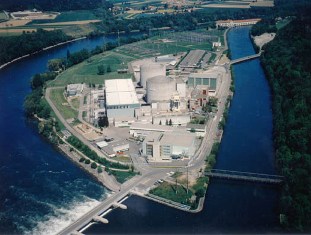Presenting the cabinet’s new energy policy, Energy Minister Moritz Leuenberger said the replacement of existing nuclear plants or the building of new ones would be necessary: "We can't carry on as we have been up to now, otherwise we are going to run into supply problems."
 As well as nuclear, the policy focuses on energy efficiency, renewable sources, and large gas-fired plants, although gas plants would be a "temporary" measure. The policy has been criticised by left-wing political parties and ecological groups but broadly welcomed by right-wing parties and business leaders, with some reservations about construction of gas plants.
As well as nuclear, the policy focuses on energy efficiency, renewable sources, and large gas-fired plants, although gas plants would be a "temporary" measure. The policy has been criticised by left-wing political parties and ecological groups but broadly welcomed by right-wing parties and business leaders, with some reservations about construction of gas plants.Swiss politics is dominated by referenda. Three times between 1979 and 1984 the public voted in favour of nuclear energy before a 1990 poll introduced a ten-year moratorium on new nuclear plants. In 1998 the government decided to eventually phase out the use of nuclear electricity but a 2000 law on the emission of carbon dioxide gave the nuclear industry hope. In 2003 another public vote reinstated the use of nuclear as an option for the future.
Bruno Pellaud of the Swiss Atomic Forum told WNN that the country's latest change of tack was precipitated by three factors. First, that current power stations of all types must be replaced in coming years. Increases in demand led Switzerland to import electricity all year round for the first time in 2006. By 2020, the country could face a shortfall of 20 TWh/y, 25% of electricity supply.
Second, replacing current nuclear plants with ones fired by imported coal or gas would raise security of supply issues.
And third, the country has long used a low-carbon generation mix of 60% hydro and 40% nuclear. Any increase in the use of fossil fuel would increase emissions and make it very hard for Switzerland to meet its Kyoto Protocol commitments.
Pellaud said that the government's decision that Switzerland's current four nuclear plants (Beznau, Gösgen, Leibstadt and Mühleberg) must be replaced by new nuclear plants is a "clear signal to the industry to come up with some specific plans" in coming months. However, any specific project would be the subject of another nationwide referendum.
Further information
Swiss Atomic Forum
WNA's Nuclear Power in Switzerland information paper




_28178.jpg)
_66891.jpg)
_30199.jpg)
_72306.jpg)





